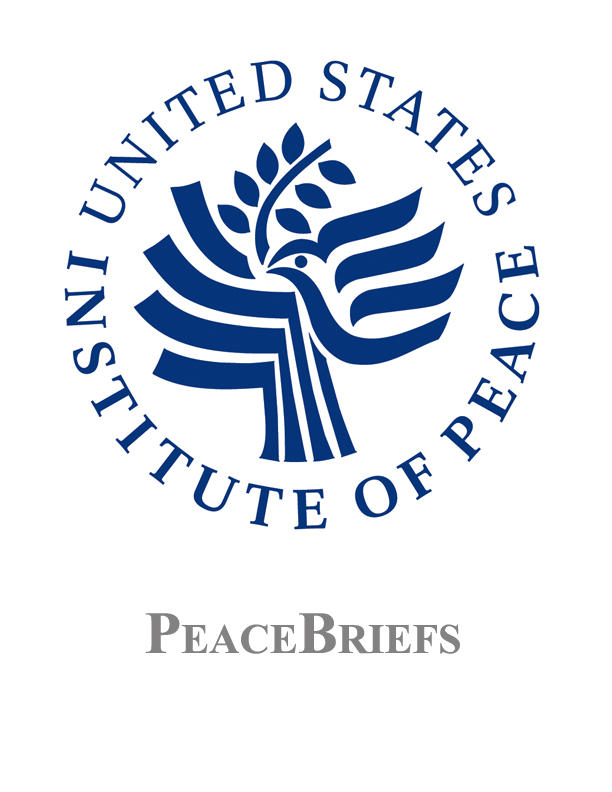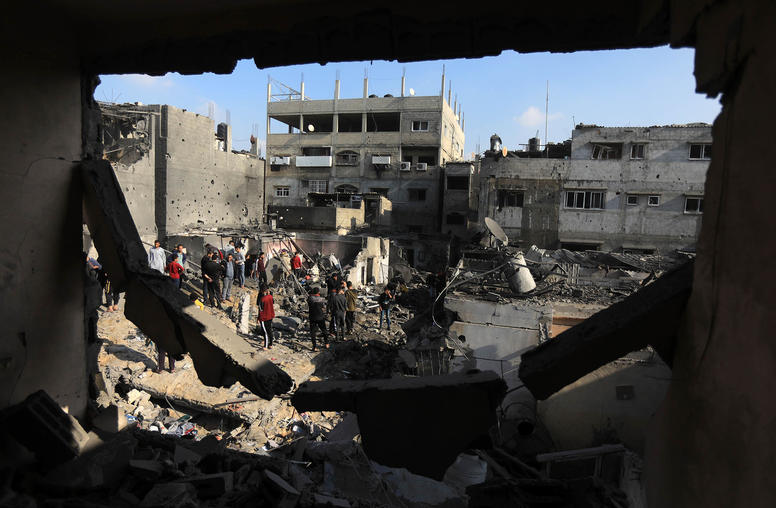The Military and the Making of Foreign Policy
Since the end of the Cold War, the U.S. military has been given a challenging array of new assignments, including post-conflict peacekeeping operations and the mission of defeating international terrorism. Has America grown too dependent on the military to manage foreign affairs?

At the same time its status as the instrument of the world's only superpower gives the American military unprecedented potential influence in global affairs. Has America grown too dependent on the military to manage foreign affairs? How are strategic security issues and foreign policy making processes intermixed in other countries?
On April 23, 2003 the U.S. Institute of Peace hosted a Current Issues Briefing to explore these and other questions. Moderated by a former Institute president, Ambassador Samuel W. Lewis, the panel featured Washington Post correspondent and former Institute guest scholar Dana Priest; military sociologist Charles Moskos; and Israeli civil-military relations expert and former Institute fellow Yoram Peri.
A New Mission for the Military
According to journalist Dana Priest, author of The Mission: Waging War and Keeping Peace with America's Military, perhaps the most notable turning point for the military in the post-Cold War era was Operation Provide Comfort. Managing humanitarian assistance to the Iraqi Kurds, the U.S. military found itself having to handle challenges from combat to peacekeeping to refugee relief. Beginning with this mission, Priest pointed out, the regional unified commanders-in-chief (CINCs), with the Pentagon's substantial resources at their disposal, moved to fill gaps in the formulation and execution of U.S. foreign policy.
Priest found in her extensive travels and interviews that the CINCs spent up to 200 days each year flying in their own jumbo jets with a large staff to meet with foreign military and non-military officials and participate in a range of programs within their respective regions. Priest noted that while the State Department contracted its presence—closing 50 embassies and consulates across the globe and letting go of 20 percent of its staff during the 1990s—the military with its resources was in many ways in a much better position to conduct traditional diplomatic activities such as regional cooperation and trust-building projects.
Priest cautioned that while U.S. foreign policy has become too dependent on the military, the military's vast resources make it a valuable resource in meeting the policy challenges facing U.S. policymakers in the post 9/11 world. Priest also argued for a more balanced approach to the management of U.S. foreign affairs. Pointing to ongoing difficulties that the United States is having in efforts to stabilize Afghanistan, Priest stressed that the U.S. military alone could not rebuild Afghanistan or Iraq. However, she also cautioned that if the State Department and other U.S. agencies are to play a more active role in peacebuilding and other activities they must have support from both the Congress and the administration. "The vacuum [during the 1990s]," Priest noted in closing, "was filled by the military because no one—Clinton, Congress, or others—valued the [State] Department or nonmilitary instruments in the way they should."
Peacekeeping and the Warrior Ethic
Drawing from his award-winning research on the U.S. military over the years, Charles Moskos stated in his opening remarks that "the military has always had a disdain for peacekeeping." Peacekeeping was originally regarded as an activity that major world powers did not have the time or energy to concern themselves with, Moskos pointed out, and the American military has long been torn about the appropriateness of participation in peacekeeping and peacebuilding activities.
One of the arguments against the use of American forces in peacekeeping is that it "undercuts the warrior ethic." But according to recent research by Moskos, while peace operations require a very different skills set for troops in the field, they do not appear to erode esprit de corps or the troops' combat readiness. To the contrary, his research has found that troops working more closely with local communities in the Balkans had much higher morale than those troops performing more traditional military tasks at Camp Bondtseel in Kosovo.
Moreover, increased U.S. military participation in peacekeeping and peacebuilding activities, Moskos maintained, has had other benefits. In particular, increased contact and the development of working relationships with nongovernmental organizations engaged in humanitarian assistance and other projects in zones of conflict around the globe has led to a substantial growth in trust and respect on both sides.
In closing, Moskos suggested that, due to the differences in skills needed for peacekeeping versus more traditional military missions, U.S. policymakers should consider tracking new recruits. Short-term enlistments would be channeled largely into functions and units that would specialize in the types of tasks needed in peacekeeping and peacebuilding activities such as those being conducted currently in Afghanistan and Iraq. Longer-term enlistments, on the other hand, would be tracked into more traditional military functions and provide a bridge in operations requiring a mix of security and peacebuilding functions. This approach, Moskos argued, would help alleviate the military's longstanding concerns about weakening the military's combat capabilities while also providing a viable capacity to participate in peacebuilding operations.
The Political-Military Partnership in Israel
How much should the military influence the making of foreign policy in a modern democracy? According to Yoram Peri, while the Israeli military is more involved in the policymaking process than in the United States, there is still a solid civil-military balance. Peri, author of a recent Institute report on The Israeli Military and Israeli Foreign Policy, largely attributes this to the diversity of opinion found within the military, with partnerships forming between like-minded civil-military political coalitions. Therefore, on divisive policy questions such as a posture on the Israeli-Palestinian peace process, different civil-military political coalitions have formed on various sides of the debate over the past decade.
Peri also suggested that another reason civil-military cooperation in the policymaking process has worked well in Israel is the feeder function that the military can play for civilian policymakers and politicians in Israel. Since the military often serves as a channel to reach high positions later in political life many Israeli politicians have experience working with the military and maintain their own contact networks within the military. This is not only helpful for the military in effectively working with civilian policymakers, but also assists civilian policymakers in pursuing their agendas. Therefore, unlike in the U.S. system, the Israeli military plays a much more dynamic and integrated role in the policymaking process in Isreal.
In closing, Peri noted that the blurring of politics, military affairs, and policymaking seen in Israel might become a more common practice in other nations in response to complex security challenges that states now face in the post 9/11 world. "In these new types of wars, we see a new situation," Peri pointed out, "which calls for a new analysis in civil-military relations and in particular between the military and political echelon."
This USIPeace Briefing reflects the presentations and comments from "The Military and the Making of Foreign Policy"—a Current Issues Briefing held at the U.S. Institute of Peace April 23, 2003. The views summarized above reflect the discussion at the meeting; they do not represent formal positions taken by the Institute, which does not advocate specific policies.
The United States Institute of Peace is an independent, nonpartisan institution established and funded by Congress. Its goals are to help prevent and resolve violent international conflicts, promote post-conflict stability and development, and increase conflict management capacity, tools, and intellectual capital worldwide. The Institute does this by empowering others with knowledge, skills, and resources, as well as by directly engaging in peacebuilding efforts around the globe.



